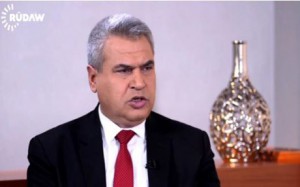Ibrahim Biro, president of the Kurdish National Council in Syria believes that international efforts such as the Geneva talks is one of the best means to find a solution for the Syria crisis and guarantee Kurdish rights. Otherwise, he says, the Kurds have to put their act together and be united in pursuing their own plans for peace and stability in Rojava as they have the best chance at the moment. Biro who opened an official office in Geneva last month “contribute to the Syria peace process” told Rudaw that other Syrian opposition groups must accept Kurdish politics and military on the ground as they expect the same from the Kurds. “What is important for the Kurds is the continuation of negotiations and what comes after the Geneva talks in terms of national conferences, transitional period, etc,” Biro said. “The solution in Syria should be for all groups, among them the Kurds in particular and the future should not be a centralized rule. It has to be of a different type.”
Certainly there are many different opposition groups. When the Saudi gathering took place all kinds of military and political groups were there. But these groups must be united around one thing and that is the rights of all ethnic, religious or political groups as were outlined clearly in Geneva 1 talks. If the points of both Geneva talks remain solid and honored then we can deal with whichever ally we may have in the future.
But you have been criticized for participating in Geneva talks with only one representative versus the regime delegation. Why didn’t you go there together with the PYD as one team?
It is not about numbers. One or two delegates would not mean our rights will be achieved. What is important is how well how envoy will raise our concerns at the talks and put them on the negotiating table. As for going in one team with the PYD, this issue came up during the Geneva II talks. We were promised that we would take part as a united and independent Kurdish delegation and we went to Moscow but Bogdanov told us there was no such thing. We are still seeing the outcome of that day. No one supported a separate Kurdish delegation from the opposition or regime delegation. Therefore we had to pick our place and we found it within the opposition. We hoped that the PYD would join the same team.
I wish the situation in Rojava were different now. And yes we have tried with them and even after our third convention we said to them that we must work together and become partners based on one of our earlier agreements. For us it is not about recognizing or not recognizing the PYD rule. It is about all of us working together and make sure that governance in Rojava is Kurdish and seen as such politically, militarily, economically, etc by everyone inside and outside the country.
The PYD is today a reality on the ground and no one can deny that. So how will you be able to go there and implement any decisions that may be made at the Geneva talks on the ground?
If the Geneva talks succeed and continue no political or military force can defy an international decision whether it is the regime, the opposition, the KNC or PYD.
If the international community or the UN decides to send troops to Syria and Rojava included, will there be a place for the Rojava Peshmerga among them?
Without a doubt, and that has been our suggestion for a while that foreign boots can bring peace to parts of Syria and allow local forces assert themselves in their areas and organize their forces properly not in the form of militia groups. In this case the Rojava Peshmerga would be able to contribute to peace and stability.
How about the Peshmerga of Rojava? Will they be part of any force for Rojava or Syria?
These Peshmerga are all Kurds from Syria. They all left the Syrian army as the war started. Their numbers slowly grew and for sure, they will play a role in the future whether inside an international force or local force and their main focus will be the defense of Syrian Kurdistan.

